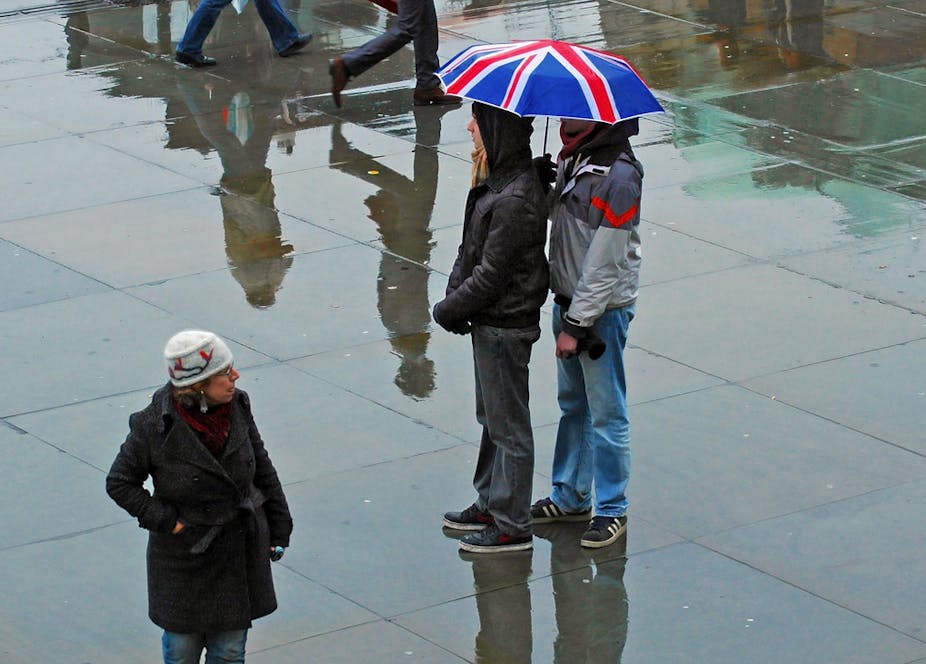Most people saw the warm dry weather from June to September as a welcome, but freak, occurrence. Because, as anyone who invested in floaty dresses, barbecues or expensive sunglasses in previous years will know, recent summers in Britain and north-western Europe have been unusually wet.
From 2007 to 2012, sunshine has been lower and rainfall higher than average, with 2012 - the summer that never was - the wettest for more than a century. With rainfall 80% higher than average, there were frequent floods, substantial damage to property, deaths and serious consequences for farming and tourism.
At the same time, during these summers, the amount of Arctic sea ice was very low. The summers between 2007 and 2012 were the six lowest years on record, with 2012 an all-time low. Could melting sea ice and wet summers be related?
In my recent study I used a climate model to investigate what impact the loss of Arctic sea ice has on weather patterns over Europe. The amount of sea ice cover in the model was changed in a controlled manner while other factors known to influence European weather were held constant. This allowed me to isolate and measure the affects of melting sea ice.
The model confirmed that when sea ice cover shrunk, the UK and north-western Europe experienced wetter summers. The pattern of rainfall anomalies in the model looked very similar to those observed in recent years. It seems reasonable to conclude that the loss of Arctic sea ice is one contributing factor in these washed-out summers.
Jet stream
Another factor that strongly influences the quality of European summers is the position of the jet stream. Jet streams are currents of strong winds, around 10km up in the atmosphere. Generally these winds blow from west to east, carrying weather systems and rain with them. During the summer, the jet stream normally lies between Scotland and Iceland, so heavy weather is carried through the Atlantic north of the British Isles. But when the jet stream shifts south, as it did for prolonged periods during the summers between 2007 and 2012, that unseasonable wet weather makes landfall in the UK.
The model confirmed that melting sea ice causes the jet stream to shift further south than normal, increasing the frequency of cloudy, cool and wet summers over north-western Europe. In contrast, Mediterranean Europe experienced drier conditions as sea ice was reduced.
The bigger picture
However, missing sea ice is only partially to blame for these soggy summers. A previous study showed how European rainfall is influenced by a slow natural cycle of warming and cooling in the uppermost levels of the North Atlantic. Since the late 1990s, the Atlantic has been in the warm phase of that cycle - known as the Atlantic Multidecadal Oscillation - which is thought to bring with it greater risk of wet summers. So the combination in recent years of low Arctic sea ice and a warmer Atlantic have further increased the odds of wet summers. Together these two factors help explain our lack of sunshine and booming welly sales through the last few summers.
But there is one other factor that cannot be ignored: the natural, chaotic and completely unpredictable element of weather systems - not least in Britain, which has always had a more than average amount of unpredictable weather. Atmospheric variability can, and often does, exceed the influence of Arctic sea ice. Melting sea ice may increase the odds of a wet summer, but it will not lead to a wet summer every year. Buying extra lottery tickets increases your chances of winning, but clearly does not guarantee success.
This summer just gone is perhaps a timely reminder - despite warmer-than-average sea surface temperatures in the Atlantic and lower-than-average Arctic sea ice cover, summer 2013 turned out to be quite warm, dry and sunny. The Met Office reports that the UK’s 2013 summer was [the driest since 2003](http://www.metoffice.gov.uk/climate/uk/2012/summer.html](http://www.metoffice.gov.uk/climate/uk/2012/summer.htm).
Future implications
What does this all mean for future summers? Will there be opportunity to wear those dresses again before the moths get to them? The Atlantic Ocean will return to its cool phase in the next decade, which is expected to bring with it warmer and drier summers. But Arctic sea ice on the other hand is expected to continue melting, favouring potentially wetter summers. The outcome of this climate tug-of-war is uncertain and hard to predict - and in that respect, it’s business as usual for the British weather.

